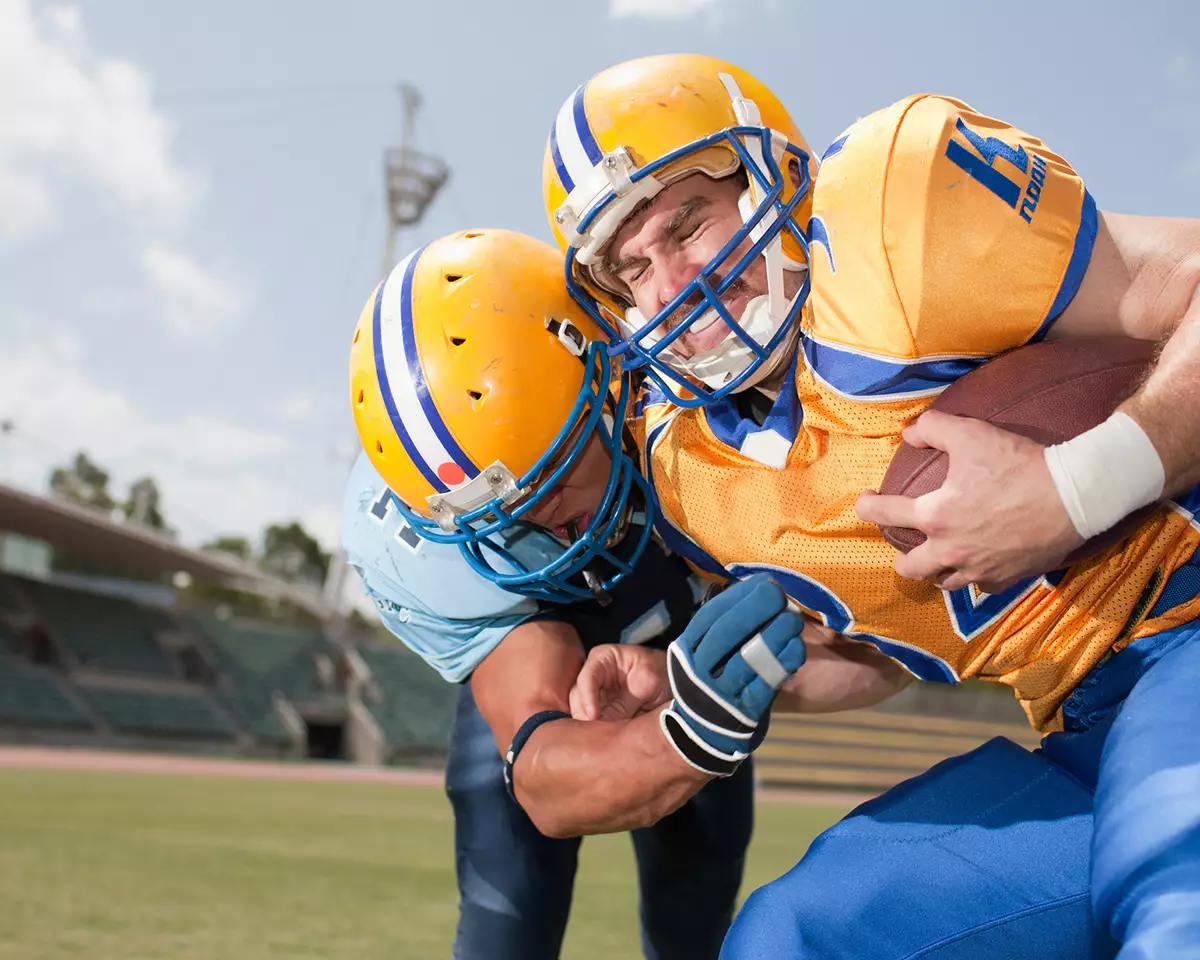What to Know about Concussions and Football

Every February, a very famous football game consumes the general American public. Football is a beloved sport and pastime that celebrates athleticism and teamwork and captures the imaginations of kids who have dreams of going pro. But as The Big Game has grown in size and spectacle over the years, more concern has bubbled up over head injuries, like concussions, in football.
There’s a lot to love about football, but there are also safety factors to consider — as there are with any sport. Here’s what to know about concussions and football.
What is a concussion?
A concussion is an injury to the brain that results from a blow, hit or jolt to the head or the body. The impact to the head or body causes the brain to move quickly in the skull, which leads to the brain not being able to function at 100 percent.
Concussions and football
Given the high-impact nature of American football, players are typically at greater risk for sustaining a concussion than the average person.
A 2015 report published by the Journal of Neurotrauma examined the frequency of head-impact-related outcomes in college-level football athletes by the position played and found that offensive linemen are at the greatest risk for repetitive impacts to the head.
The report also estimates that between 1.6-3.8 million concussions occur in the U.S. every year due to recreation and sports-related activities like football.
Safety tips to reduce brain injury during sports
An athlete can reduce the risk of concussion or other types of brain injuries by:
- Limiting bodily contact with others during the game, especially helmet-to-helmet contact in football or other helmeted sports and delaying bodychecking in hockey in youth athletes
- Reducing exposure to unnecessary contact in practice
- Strengthening neck muscles
How do I know if I have a concussion?
A concussion presents with specific signs and symptoms. Signs and symptoms often appear quickly, but some may be delayed by several days. The following signs may be observed by others:
- The person can’t recall events before or after the hit or fall
- They seem dazed, confused or stunned
- They forget things easily
- They move clumsily
- Their responses to questions are slow
- They lose consciousness (even if it is brief)
- Changes in mood, behavior or personality are present
If the following symptoms are reported by the person who experienced the jolt (versus being observed by others), they may also have a concussion:
- Headache
- Dizziness and balance problems
- Vomiting or nausea
- Vision problems, including double vision, blurry vision or troubles focusing their vision
- Sensitivity to light or noise
- Feeling sluggish, hazy or foggy
- Trouble concentrating or remembering things
Continue to check for signs of concussion in the days following the injury.
When to see a doctor for a concussion
Following a head injury, if the individual is experiencing the worst headache of their life or a progressively worsening headache, had a seizure, has numbness or tingling in the arms or legs, has persistent vomiting or had a loss of consciousness for more than a few seconds, you should go to the emergency department (ED) or visit your doctor urgently.
Some concussions do not require an ED visit, but you should seek medical attention if you have a concussion. Various treatments may be recommended to assist in your recovery.
Most sports-related concussions don’t need imaging like a CT or MRI scan. Your doctor will generally do a physical exam and history to determine the need for imaging. After having a concussion evaluated in the ED, it usually is recommended to follow up with your primary care doctor or a concussion specialist (neurologist, sports medicine physician or neurosurgeon).
Athletes who continue to play through their concussion, rather than stopping immediately and waiting to return to sports, are at a significantly higher risk of more severe symptoms and can double their recovery time. Individuals who have had multiple concussions may be at higher risk for getting a concussion with blows to the head with lower forces than their previous concussions.
While football, like most sports, can pose health risks, taking part in it safely is a great way to build your sports skills, connect with other athletes or weekend warriors, and relish in the joy that comes from running around on a field in beautiful weather with people who share your love of the game.
If you think you have a concussion, seek medical attention immediately.
If you have had a seizure, numbness or tingling in the arms, persistent vomiting or loss of consciousness for more than a few seconds you should visit your emergency department immediately. See our list of emergency department locations.
Recent News
Article
Breathe Easier: Tips for Improving Your Lung Health
Article
Chenitra Emergency Care
Article
Leading The Way in Lung Cancer Diagnosis
Article
Safety Tips for 4th of July Firework Fun
Article
Metro East Vascular Access Center
Article